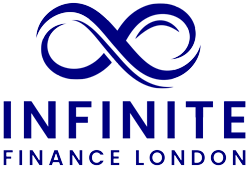Commercial Mortgages
If you're a business owner looking to buy, develop or refinance a property for commercial use, a commercial mortgage might be the right solution for you. Unlike residential mortgages, commercial mortgages are tailored for business premises, investment properties, or commercial development projects.
If you need help securing a commercial mortgage, contact Infinite Finance London at 020 3813 7800 to book a free, no-obligation consultation with our advisors.
Table of Contents
- What Is a Commercial Mortgage?
- Key Features of Commercial Mortgages
- Different Types of Commercial Mortgages
- Key Things to Know Before Applying for a Commercial Mortgage
- How Businesses Use Commercial Mortgages
- Who Is Eligible for a Commercial Mortgage?
- Key Eligibility Criteria for a Commercial Mortgage
- How Much Deposit Is Needed for a Commercial Mortgage?
- What Interest Rates Apply to Commercial Mortgages?
- Why Use a Commercial Mortgage Broker?
- Speak to a Commercial Mortgage Expert Today
What Is a Commercial Mortgage?
A commercial mortgage is a type of loan specifically designed for businesses, secured against a property used for commercial purposes, not a personal home. This kind of financing helps businesses buy, develop, or refinance commercial real estate like offices, shops, warehouses, or land intended for business use.
Unlike residential mortgages, commercial mortgages come with different terms because the properties and risks involved are quite different.
Key Features of Commercial Mortgages
Commercial mortgages come with some important features that make them different from regular home loans. Understanding these can help businesses choose the right financing for their property needs. Here are the key points to know:
- Purpose: These loans are used to fund business-related properties, whether you're buying a new office, a retail space, a warehouse, or land for commercial development.
- Property Type: The mortgage is secured against commercial property, not a house or flat for personal living.
- Loan Amounts: Since commercial properties tend to be more expensive, commercial mortgages usually involve larger loan amounts compared to residential mortgages.
- Interest Rates: Because lending for commercial property can carry more risk, the interest rates are often higher than those on residential mortgages.
- Risk Assessment: Lenders carefully evaluate the health of your business, the income potential of the property, and market conditions before approving the loan.
- Recourse vs. Non-Recourse Loans: Some commercial mortgages are recourse loans, meaning if you default, the lender can pursue other business assets beyond the property to recover their money. Others are non-recourse, where the lender's claim is limited to the property itself.
Different Types of Commercial Mortgages
If you're planning to buy, refinance, or develop a business property, you'll likely need a commercial mortgage. Unlike residential mortgages, these loans are secured against properties used for business purposes, such as shops, offices, warehouses, or mixed-use buildings.
But not all commercial mortgages are the same. There are several types available, each designed to meet different needs and circumstances.
Common types of commercial mortgages in the UK and how they work:
1. Owner-Occupied Commercial Mortgages
These are ideal if your business wants to buy a property to use as its own premises, such as an office, warehouse, shop, or workshop.
- Also known as trading business mortgages or Opco/Propco finance.
- Lenders will assess your company's financial health and the value of the property.
- Mortgage terms typically range from 15 to 25 years.
- You can choose between fixed or variable interest rates, depending on what suits your cash flow best.
This type of commercial mortgage allows you to invest in your future while building equity in your own business premises.
2. Commercial Investment Mortgages
These are designed for those looking to buy commercial property as an investment, to generate income through rent.
- Suitable for retail units, office buildings, industrial sites, and more.
- Lenders focus on the potential rental income and the strength of your investment plan.
- These mortgages can include interest-only options, helping you manage cash flow during the loan term.
Perfect for landlords and businesses expanding their commercial property portfolio.
3. Semi-Commercial (Mixed-Use) Mortgages
Semi-commercial mortgages are used to purchase or refinance properties with both residential and commercial elements.
Examples include:
- A shop with flats above
- A pub with on-site living accommodation
Lenders assess both the business income and the rental potential from the residential part. This is a great solution if you're investing in mixed-use properties that generate multiple income streams.
4. Buy-to-Let Mortgages (Commercial and Residential)
Buy-to-let mortgages are for landlords who purchase property specifically to rent it out.
There are two main types:
- Residential Buy-to-Let: for houses or flats rented to tenants.
- Commercial Buy-to-Let: for business properties like retail units, restaurants, or warehouses.
Lenders focus on expected rental income, tenant demand, and the location of the property. These are popular options for investors looking to generate ongoing returns.
5. Property Development Mortgages
These are used to fund new construction projects or major refurbishments of existing commercial buildings.
- Ideal for developers or businesses building from the ground up.
- Lenders evaluate the project's viability, your experience, and the projected value of the completed property.
- Funds are usually released in stages as the development progresses.
This type of loan helps bring your commercial property development plans to life.
6. Bridging Loans
Bridging loans are short-term solutions used to quickly raise capital, often while waiting for another transaction to complete.
- Useful if you're buying a new property while selling another.
- Available for both commercial and residential purposes.
- Typically carry higher interest rates due to the short-term nature of the loan.
If you need fast, flexible financing, bridging loans can help you bridge the gap between transactions.
7. Opco/Propco Finance
This more complex finance structure involves separating the operating business (Opco) from the property-holding company (Propco).
- Often includes sale-and-leaseback arrangements, where the business sells its premises to release capital, then leases it back.
- Common in sectors like healthcare, hospitality, and manufacturing.
It's a smart way for businesses to unlock capital without giving up their operational base.
Unsure which commercial mortgage fits your business needs? Call Infinite Finance London on 020 3813 7800 and let our experts guide you through the best options.
Key Things to Know Before Applying for a Commercial Mortgage
Applying for a commercial mortgage can feel overwhelming, but understanding some important factors can make the process smoother:
1. Interest Rates
Commercial mortgage rates can be either fixed or variable. The exact rate you get depends on your financial strength, the property's value, and each lender's specific criteria.
2. Loan Terms
Most commercial mortgages last anywhere from 5 to 25 years. For certain types, like investment or mixed-use properties, shorter terms of 5 to 10 years are quite common.
3. Deposit Requirements
You'll usually need to put down a deposit ranging from 10% to 35% of the property's value. This depends on the lender, the type of loan, and how risky your application looks.
4. Loan-to-Value (LTV) Ratios
Lenders typically offer up to 75–80% LTV, meaning you can borrow most of the property's price, but this varies based on your financial profile and the kind of property.
Keeping these points in mind will help you prepare for your commercial mortgage application with confidence.
How Businesses Use Commercial Mortgages
Commercial mortgages are a vital financial tool that helps businesses invest in property to grow and succeed. But how exactly do businesses use these loans? Here's a simple breakdown:
1. Buying Property for Business Use
Many businesses take out commercial mortgages to purchase premises like offices, retail stores, warehouses, or factories where they run their day-to-day operations.
2. Refinancing Existing Properties
Sometimes, businesses use commercial mortgages to refinance an existing property loan. This can free up cash that can be reinvested back into the business or used to pay off other debts.
3. Funding Development and Renovations
Commercial mortgages can also cover the costs of developing new buildings or refurbishing existing ones, helping businesses improve their facilities and add value to their property.
4. Investing for Rental Income
Some businesses or investors use commercial mortgages to buy properties purely for rental income, turning commercial real estate into a steady revenue stream.
In short, commercial mortgages give businesses the financial flexibility to buy, improve, and manage property, making them a key part of many growth strategies.
Who Is Eligible for a Commercial Mortgage?
If you're considering a commercial mortgage, it's important to understand what lenders look for before approving your application. Eligibility isn't just about whether you want to buy a business property; it's about proving your business is financially stable and capable of repaying the loan.
Key Eligibility Criteria for a Commercial Mortgage
Business Financial Health
Lenders will closely examine your cash flow, current debt levels, and projected income to make sure your business can comfortably afford the monthly repayments.
Credit History
A strong credit history, both personal and business, shows lenders that you're reliable and responsible when it comes to borrowing.
Deposit Requirement
You'll usually need to provide a deposit of between 20% and 40% of the property's value. The higher your deposit, the better your chances of approval and getting a competitive interest rate.
Trading History
Lenders often want to see 2 to 3 years of trading accounts to assess the stability and performance of your business over time.
Property Suitability
The property must be suitable as security for the loan. Lenders will assess its market value and condition before agreeing to finance.
Loan-to-Value (LTV) Ratio
Most commercial mortgages have an LTV ratio of around 75% to 80%, meaning the lender will fund up to 80% of the property's value, and you'll need to cover the rest.
Business Experience and Income Projections
Lenders may also look at your experience in the industry and how you plan to grow or sustain your income in the future, especially if you're relying on rental income from the property.
Age of Applicant
Typically, the main applicant should be between 18 and 75 years old at the time of application.
Refinancing Considerations
If you're refinancing an existing commercial mortgage, lenders will also consider your current equity position, financial goals, and how much interest you're currently paying.
How Much Deposit Is Needed for a Commercial Mortgage?
Typically, you'll need a deposit of 20% to 40% of the property's purchase price when applying for a commercial property mortgage. The exact amount depends on the lender's requirements, the type of property, and your business's financial profile.
A larger deposit can increase your chances of approval and help you access more competitive interest rates. This deposit acts as a safeguard for lenders in case of default, which is why loan-to-value (LTV) ratios are so important in commercial lending.
What Interest Rates Apply to Commercial Mortgages?
Commercial mortgage rates can vary depending on your credit profile, the size of the loan, the property type, and the lender you choose. Rates are usually higher than residential mortgage rates because of the increased risk involved. Some loans have variable rates tied to the Bank of England base rate, while others offer fixed-rate options.
Working with a commercial mortgage broker can help you find the most competitive rate for your circumstances.
Why Use a Commercial Mortgage Broker?
Using a commercial mortgage broker in the UK can make the process quicker, easier, and more cost-effective. Brokers have access to a wide panel of lenders, including those not available to the public. They can help you find the right mortgage for your needs, negotiate better terms, and manage all the paperwork.
Here's how a commercial mortgage broker can benefit your business:
1. Access to More Lenders and Deals
Brokers work with a wide network of lenders, including banks, specialist lenders, and private providers. Some deals are only available through brokers, meaning you could miss out by going directly to a bank.
2. Saves Time and Reduces Hassle
From comparing mortgage options to handling paperwork, a broker does the legwork for you. This saves you valuable time and lets you stay focused on your business.
3. Better Rates and Terms
Thanks to their industry knowledge and negotiation skills, brokers often secure better interest rates, flexible terms, and reduced fees, deals that may not be publicly available.
4. Tailored Advice Based on Your Business
Every business is different. A broker will assess your goals, financial situation, and property type to match you with the most suitable mortgage options.
5. Expert Guidance Every Step of the Way
Commercial mortgages can be complicated. A broker helps you understand the process, explains your options clearly, and supports you from start to finish.
6. Transparent and Cost-Effective
Good brokers are upfront about their fees, so you know what to expect. In many cases, the value they bring far outweighs the cost of their service.
If you're buying or refinancing a commercial property, a broker can help you navigate the market, save money, and secure the right deal for your business needs.
To get the best commercial mortgage deal and secure the right financing for your business property, call Infinite Finance London on 020 3813 7800 today.
Speak to a Commercial Mortgage Expert Today
Ready to explore your commercial mortgage options? Call our expert commercial mortgage broker on 020 3813 7800 for personalised advice and competitive rates.
There are several ways to contact Infinite Finance London:
- Phone: 020 3813 7800
- Email: info@infinite-finance.co.uk
- Online: Fill in our online enquiry form
- Address: 7A, Glenmore Parade, Ealing Rd, Wembley HA0 4PJ



